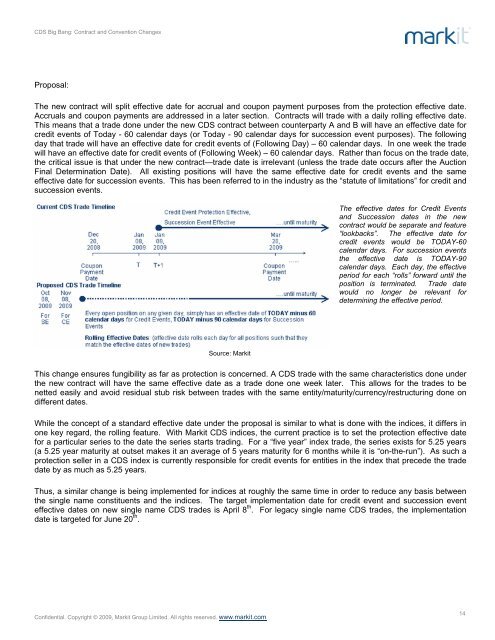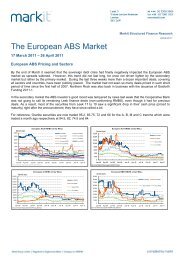The CDS Big Bang Research Report - Markit.com
The CDS Big Bang Research Report - Markit.com
The CDS Big Bang Research Report - Markit.com
You also want an ePaper? Increase the reach of your titles
YUMPU automatically turns print PDFs into web optimized ePapers that Google loves.
<strong>CDS</strong> <strong>Big</strong> <strong>Bang</strong>: Contract and Convention Changes<br />
Proposal:<br />
<strong>The</strong> new contract will split effective date for accrual and coupon payment purposes from the protection effective date.<br />
Accruals and coupon payments are addressed in a later section. Contracts will trade with a daily rolling effective date.<br />
This means that a trade done under the new <strong>CDS</strong> contract between counterparty A and B will have an effective date for<br />
credit events of Today - 60 calendar days (or Today - 90 calendar days for succession event purposes). <strong>The</strong> following<br />
day that trade will have an effective date for credit events of (Following Day) – 60 calendar days. In one week the trade<br />
will have an effective date for credit events of (Following Week) – 60 calendar days. Rather than focus on the trade date,<br />
the critical issue is that under the new contract—trade date is irrelevant (unless the trade date occurs after the Auction<br />
Final Determination Date). All existing positions will have the same effective date for credit events and the same<br />
effective date for succession events. This has been referred to in the industry as the “statute of limitations” for credit and<br />
succession events.<br />
Source: <strong>Markit</strong><br />
This change ensures fungibility as far as protection is concerned. A <strong>CDS</strong> trade with the same characteristics done under<br />
the new contract will have the same effective date as a trade done one week later. This allows for the trades to be<br />
netted easily and avoid residual stub risk between trades with the same entity/maturity/currency/restructuring done on<br />
different dates.<br />
While the concept of a standard effective date under the proposal is similar to what is done with the indices, it differs in<br />
one key regard, the rolling feature. With <strong>Markit</strong> <strong>CDS</strong> indices, the current practice is to set the protection effective date<br />
for a particular series to the date the series starts trading. For a “five year” index trade, the series exists for 5.25 years<br />
(a 5.25 year maturity at outset makes it an average of 5 years maturity for 6 months while it is “on-the-run”). As such a<br />
protection seller in a <strong>CDS</strong> index is currently responsible for credit events for entities in the index that precede the trade<br />
date by as much as 5.25 years.<br />
Thus, a similar change is being implemented for indices at roughly the same time in order to reduce any basis between<br />
the single name constituents and the indices. <strong>The</strong> target implementation date for credit event and succession event<br />
effective dates on new single name <strong>CDS</strong> trades is April 8 th . For legacy single name <strong>CDS</strong> trades, the implementation<br />
date is targeted for June 20 th .<br />
Confidential. Copyright © 2009, <strong>Markit</strong> Group Limited. All rights reserved. www.markit.<strong>com</strong><br />
<strong>The</strong> effective dates for Credit Events<br />
and Succession dates in the new<br />
contract would be separate and feature<br />
“lookbacks”. <strong>The</strong> effective date for<br />
credit events would be TODAY-60<br />
calendar days. For succession events<br />
the effective date is TODAY-90<br />
calendar days. Each day, the effective<br />
period for each “rolls” forward until the<br />
position is terminated. Trade date<br />
would no longer be relevant for<br />
determining the effective period.<br />
14








